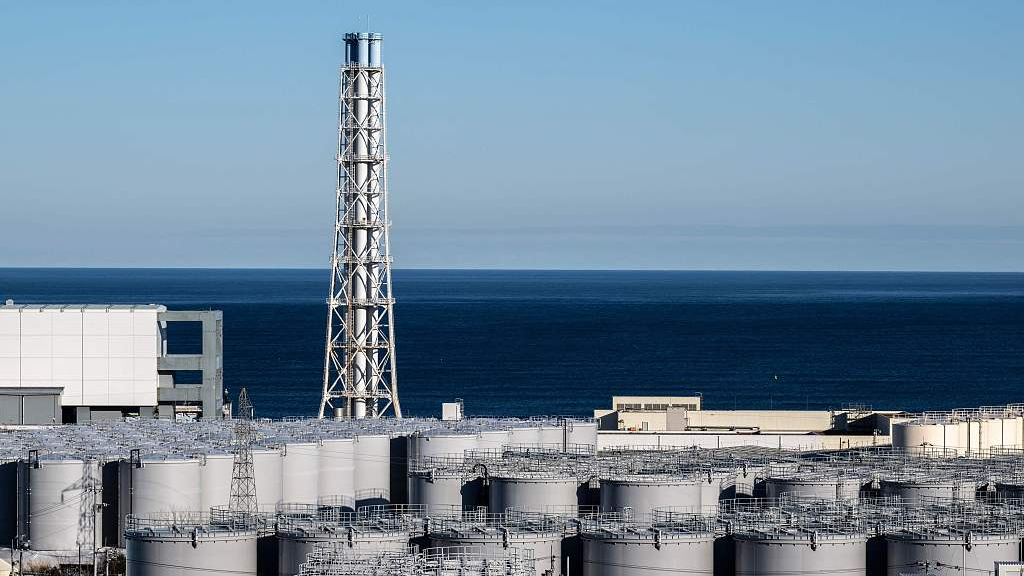
A general view shows storage tanks for contaminated water at the Tokyo Electric Power Company's (TEPCO) Fukushima Daiichi nuclear power plant, in Okuma of Fukushima prefecture. /VCG
A general view shows storage tanks for contaminated water at the Tokyo Electric Power Company's (TEPCO) Fukushima Daiichi nuclear power plant, in Okuma of Fukushima prefecture. /VCG
China has once again urged Japan to take the legitimate concerns of all parties seriously about disposing the nuclear-contaminated wastewater and not to start dumping the radioactive wastewater into the sea without full consultation and consensus with stakeholders and relevant international organizations.
Commenting on a recent report on members of South Korea's largest opposition Minjoo Party expressing grave concern over Japan's discharge of contaminated wastewater into the Pacific Sea, and the massive protests held recently in Japan against the Japanese government's disposal plan, Chinese Foreign Ministry spokesman Wang Wenbin stressed that Japan's plan will bring unpredictable danger to the world.
"China has repeatedly expressed grave concern and opposition to the Japanese government's decision to discharge Fukushima nuclear-contaminated water into the sea. The nuclear-contaminated water was in direct contact with the melted reactor cores in Fukushima nuclear accident, and contains more than 60 radionuclides, many of which cannot be treated effectively with existing technologies. Some long-living radionuclides may spread with ocean currents and form a bioconcentration effect, which will multiply the total amount of radionuclides in the environment, causing unpredictable hazards to the marine environment and human health," said Wang.
Japan claims that ALPS-treated nuclear-contaminated water is safe and harmless. However, the maturity and effectiveness of the ALPS technology have not been evaluated or certified by a third party. There is no precedent to the handling of such a large amount of nuclear-contaminated water that contains so many complex components, and whether the ALPS will remain effective in the long run remains a question.
According to data released by Japan earlier this month, 70 percent of ALPS-treated nuclear-contaminated water failed to meet the standards. Moreover, relevant data was provided by the Tokyo Electric Power Company (TEPCO), which has been tampering with or covering up the data.
Wang stressed that Japan should stop shirking its responsibilities and must shoulder its obligation to treat the nuclear-contaminated wastewater in a safe manner in line with its international obligations, international safety standards and internationally accepted good practices.
"According to general international law and the United Nations Convention on the Law of the Sea, Japan is under the obligation to take all measures to prevent environmental pollution, notify and fully consult with potentially-affected countries, assess and monitor the environmental impact, take preventive measures to minimize risks, ensure transparency of information and carry out international cooperation. However, the Japanese side has tried to evade its responsibilities and obligations with various excuses and decided to dump the nuclear-contaminated water into the sea for its own selfish interests without fully studying and demonstrating other disposal options. This is an extremely irresponsible act of putting other countries and the entire mankind under huge risk," said Wang.
"We once again urge the Japanese side to squarely face the legitimate concerns of the international community and its own people, dispose the nuclear-contaminated water in a safe manner in line with its international obligations, international safety standards and internationally accepted good practices, including fully studying alternatives to ocean discharge, and avoid transferring unpredictable risks to the international community. Japan must not start discharging the nuclear-contaminated water into the sea without making full consultation and reaching consensus with neighboring countries and other stakeholders and relevant international organizations," he said.
In 2011, following a massive earthquake off Japan's coast, three of the reactors at the Fukushima Daiichi Nuclear Power Station melted down after a 15-meter-high tsunami smashed into the shore-side facility.
As the tainted water being stored in tanks at the plant is expected to soon reach capacity, Japan decided in April 2021 to start dumping about 1.25 million tons of nuclear wastewater into the ocean spanning 30 years from 2023.
(If you want to contribute and have specific expertise, please contact us at nature@cgtn.com.)